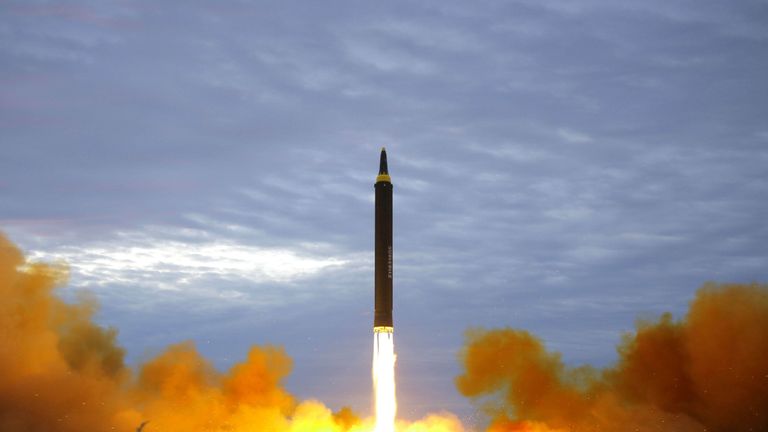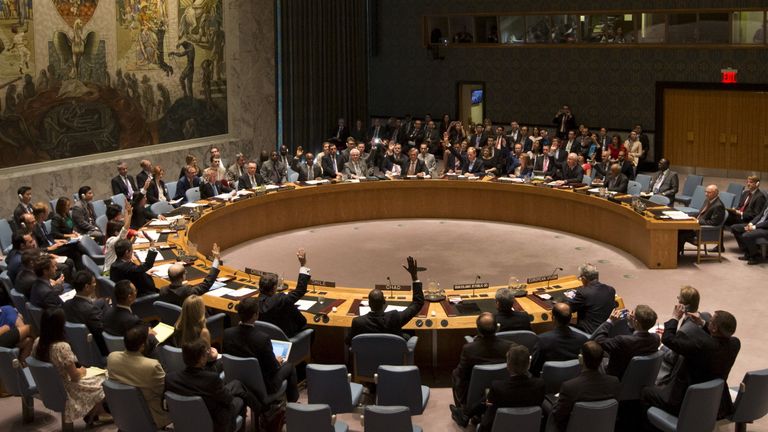North Korea 'fires ballistic missile' over Japan
The launch comes a day after the North threatened to "sink Japan" and reduce the US to "ashes and darkness" over new sanctions.
Friday 15 September 2017 13:55, UK
North Korea has fired a ballistic missile over Japan, the Japanese government has said, as it condemned the latest "reckless act".
The missile was launched eastwards from Pyongyang, reaching an altitude of around 770km (478 miles) and flying for about 19 minutes over a distance of around 3,700km (2,299 miles), South Korea's military said.
It flew over Hokkaido in northern Japan and fell into the Pacific Ocean, sparking a nationwide alert.
US Secretary of Defence Jim Mattis said the launch "put millions of Japanese into duck and cover", although residents in northern Japan appeared to remain calm.
US Pacific Command said an initial assessment indicated the launch of an intermediate range ballistic missile (IRBM).
It added that the projectile did not pose a threat to North America or the US Pacific territory of Guam, towards which Pyongyang had previously threatened to launch a missile.
::
The UN Security Council said it will hold an emergency meeting on Friday, while US Secretary of State Rex Tillerson called on all nations to take "new measures" against the North.
Japan's Prime Minister Shinzo Abe said the provocation "trampled on the international society's desire for a peaceful solution" and that "the reckless act" was "absolutely unacceptable".
A spokesman fro Russian President Vladimir Putin criticised the latest launch and warned it will lead to a spike in regional tensions.
China meanwhile called for all sides to seek dialogue to reduce tensions.
The launch comes a day after North Korea threatened to "sink Japan" and reduce the US to "ashes and darkness" for supporting a UN Security Council resolution imposing new sanctions.
::
The sanctions followed the North's sixth nuclear test, and by far its most powerful, on 3 September.
Meanwhile, the US General who oversees America's nuclear forces said he believes North Korea did in fact test a hydrogen bomb on 3 September.
Although Pyongyang claimed it successfully tested a hydrogen bomb, the US had previously declined to characterise it.
::
Air Force General John Hyten, head of the US military's Strategic Command, said: "I'm assuming it was a hydrogen bomb. I have to make that assumption as a military officer.
"I'm not a nuclear scientist, so I can't tell you this is how it worked, this is what the bomb was ... but I can tell you the size that we observed and saw tends to me to indicate that it was a hydrogen bomb and I have to figure out what the right response is with our allies as to that kind of event."
A hydrogen bomb usually uses a primary atomic bomb to trigger a secondary, much larger explosion.
Such a weapon, with the first stage based on nuclear fission - splitting atoms - and the second on nuclear fusion, produces a blast that is much more powerful than traditional atomic bombs, or "pure fission" devices.
::
"The sheer destruction and damage that you can create with a weapon that size is significantly of a concern," Gen Hyten said.
However, he said the North still had not demonstrated that it had a reliable intercontinental ballistic missile (ICBM) that could deliver a nuclear warhead.
But he noted it was only a matter of time before its scientists achieved that, given the pace of testing, adding it could be months or years.










